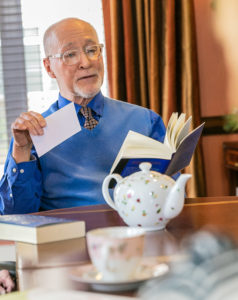The Magnetic Appeal of Contemporary Poetry
Stephen Tippett arrives to our conversation prepared; he has two of Poet Laureate Billy Collins’ poetry anthologies in tow and a printed document that summarizes how his regular Monday poetry group with other residents of The Hill at Whitemarsh came to be. Tippett might be a retired college professor, but his passion for teaching seems to be in his blood.
Together with his friend and poetry enthusiast Georgene Taylor, we spend a little over an hour sipping tea at the café at The Hill, talking about creativity, art, poetry and the beauty of being able to pursue them all in retirement. For Tippett, his love of poetry came naturally, as he taught modern language and religion at Arcadia University for 21 years, and followed that up with 13 years teaching in the Intellectual Heritage program at Temple University. Taylor, although she is an accomplished painter who trained at the Pennsylvania Academy of the Fine Arts, was comfortable with creativity, but more skeptical of poetry.
“They taught us poetry when I was in school, and no one was very interested in it at the time,” recalls Taylor. “But I discovered poetry later in life in the most unexpected way; I was waiting to have my car repaired and picked up a book of poetry in the waiting area. It was filled with contemporary poetry, and it was eye opening.”
Taylor brought it up over dinner one night with Tippett and another friend, Jean Meyers, who told them that her father used to read poetry at the dinner table. The friends decided to explore their mutual interest in contemporary poems by informally meeting on Mondays in the lounge at The Hill to discuss poems from Collins’ first poetry anthology, Poetry 180.
Thus, “Poems In The Pub” was born.
“The poems are very short, accessible and great catalysts for discussion,” says Tippett. “They inspire discussion, trigger personal memories and allow us to segue out of the poem and into our personal lives, bringing us all closer together. As a newer resident of The Hill, it’s been a great way to make friends.”
At this point in our discussion, Tippett asks me if he can read me a poem from Poetry 180, and of course I oblige. He flips through the book and starts to read a poem called “Sentimental Moment or Why Did the Baguette Cross the Road?” by Robert Hershon.
This sweet poem about a father and son brought up a lot of feelings about aging for both Tippett and Taylor. They both found it beautiful that the father would reach out for his son’s hand for support as the two are crossing the street. I had another take on it: I was touched by the power of being a parent, that age never changes the way we want to care for and protect our little ones (even when they have grown up). The three of us dive into a deeper personal discussion about our interpretations of the poem, and I can see why Poems In The Pub has such a magnetic appeal for its participants.
“The charm of poetry is that it’s so open-ended,” says Tippett. “It helps to foster interesting discussions that allow us to explore a variety of topics that might otherwise be taboo: religion, aging, feminism, politics and relationships. The best part is that there is no right or wrong answer.”
 “It’s opening up an entirely new interest for me that I never thought about,” says Taylor. “I was surprised to have such personal interest in it, but it’s great fun, and I’m so thankful for this poetry group.”
“It’s opening up an entirely new interest for me that I never thought about,” says Taylor. “I was surprised to have such personal interest in it, but it’s great fun, and I’m so thankful for this poetry group.”
For both Tippett and Taylor, the poetry group is a great example of how they are taking advantage of their retirement and pursuing new avenues of interest. The transition into retirement isn’t always easy. When Tippett retired five years ago, it was quite a drastic change, and at first he was unsure how to spend his newfound free time. He began painting as a creative outlet and painted for two straight years, with much of his work ending up in galleries around the Philadelphia area. When he moved to The Hill in June 2018, he was excited to meet new people and have new experiences. Poetry In The Pub was a byproduct of that attitude.
“I know people think they’d have no interest in poetry, but there’s freedom in being open to trying something new,” Taylor says.
“Poetry can take something ordinary and lift it up so that you see it in a whole new way,” Tippett adds. “It’s really quite meaningful. Poetry is really all about how that combination of words makes you feel and the memories they conjure up for you.”
Poetry has also deepened the friendships of those who arrive on Mondays for the discussions.
“It universalizes, in an artistic way, our human experiences and celebrates life,” Tippett says. He pauses for a moment and then laughs before saying: “I really don’t feel retired anymore—I feel recycled!”
